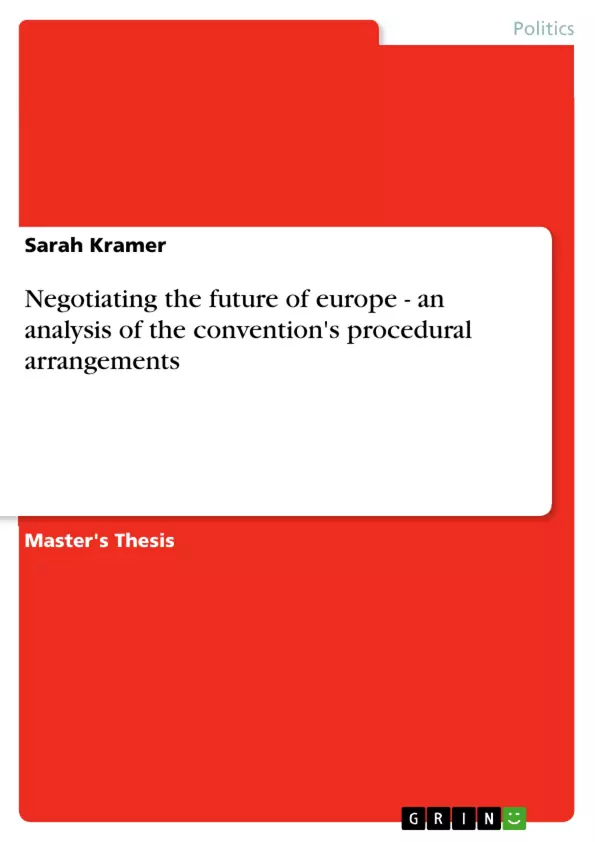The dissertation will focus on the Convention on the Future of Europe which
was launched in March 2002 and which is operating the task to prepare the
next Intergovernmental Conference (IGC) in 2004. Main issues on the
Convention’s working plan are a draft constitution and the preparation of EU
institutions for the enlargement.
Given that the Convention has started its work in March 2002 and will
approximately end in Spring / Summer 2003, its work is still in progress. That
is why it would be difficult to write on the outcome and either predict or judge
its success. That is why the focus lies on the procedural arrangements within
the Convention Method and explicitly not on its content. Therefore the
dissertation will deal, in general, with the negotiation process. In detail, the
focus will examine the Convention’s kind of procedural arrangements, the
operative mode and the working method or in short: the Convention Method
and its difference compared with former IGCs and their preparing groups.
Thus, the dissertation’s main part is build on four parts: The first chapter will set up a definition for an IGC while considering various perspective from legal over formal via practical to theoretical. Then, the second chapter will
introduce the history and the task of IGCs and their preparing groups by
looking at the setting, procedural arrangements and the mandate, whilst in
the third chapter, both conventions, the Convention on the Charter of
Fundamental Rights and the Convention on the Future of Europe in the
scope of the IGC 2004 will be studied. Then in the final fourth chapter, the
key question of “What makes the difference?” will be discussed. Further key
questions that fall into the scope of the negotiation process touches to what
extend the kind of negotiation process influence the outcome, the
harmonization of actors’ position as well as actors’ behaviour.
Inhaltsverzeichnis (Table of Contents)
- Preface
- A. Introduction
- B. The Convention Method
- Defining an IGC
- The Legal Background
- The Interactive Relationship between an IGC and the Council
- How to approach an IGC
- IGCs in a theoretical perspective
- Setting and Procedural Arrangements of former IGCS
- The first circle of IGCs: 1950 - 1957
- The second circle of IGCs: 1985 - 2000
- IGC 2004 and the twin examples of the Convention on the Charter of Fundamental Rights and the Convention on the Future of Europe
- The Convention on the Charter of Fundamental Rights
- The Future of Europe – Debate
- The Convention on the Future of Europe
- What makes the Difference?
- Negotiation Process
- Traditional Style vs. Convention Method
- Future Prospects of the Convention Method
- C. Conclusion
Zielsetzung und Themenschwerpunkte (Objectives and Key Themes)
This dissertation focuses on the Convention on the Future of Europe, a body launched in 2002 with the task of preparing the next Intergovernmental Conference (IGC) in 2004. The dissertation examines the Convention's procedural arrangements, specifically the "Convention Method" and its differences from previous IGCs. Key themes explored in this work include:- The nature and function of Intergovernmental Conferences (IGCs).
- The historical development of IGCs and their preparatory groups.
- The distinct features of the Convention Method, particularly in comparison to traditional IGC preparations.
- The influence of negotiation processes on the outcomes of IGCs and the behavior of participating actors.
- The complex interplay between intergovernmentalism and supranationalism within the European Union.
Zusammenfassung der Kapitel (Chapter Summaries)
- A. Introduction: This chapter introduces the concept of "ever closer Union" in the European integration process and highlights the challenges posed by EU enlargement. It establishes the role of Intergovernmental Conferences (IGCs) in addressing treaty amendments and reforms, emphasizing the influence of preparatory committees on IGC outcomes.
- B. The Convention Method: This chapter begins by defining IGCs, exploring their legal background, and examining the relationship between IGCs and the Council. It then delves into various perspectives on IGCs, including theoretical, legal, and practical approaches. The chapter proceeds with a historical analysis of IGCs and their preparatory groups, focusing on the setting, procedural arrangements, and mandates of different IGCs throughout the EU's history. Finally, the chapter examines the Convention on the Charter of Fundamental Rights and the Convention on the Future of Europe, highlighting their distinct characteristics in relation to IGC 2004.
Schlüsselwörter (Keywords)
The main keywords and focus topics of this dissertation include Intergovernmental Conferences (IGCs), Convention Method, European Union, negotiation processes, EU enlargement, intergovernmentalism, supranationalism, institutional reform, and treaty amendments.Frequently Asked Questions
What was the Convention on the Future of Europe?
Launched in 2002, it was a body established to prepare for the 2004 Intergovernmental Conference, focusing on a draft constitution and EU enlargement.
What is the "Convention Method" in EU politics?
It is a more transparent and inclusive negotiation process involving national parliaments, the European Parliament, and civil society, rather than just government representatives.
How does a Convention differ from an Intergovernmental Conference (IGC)?
Traditional IGCs are often held behind closed doors by diplomats. The Convention Method aims for public debate and a broader consensus before the final IGC negotiations.
What are "procedural arrangements" in this context?
They refer to the rules, working methods, and structures (like the Praesidium) that govern how discussions are held and decisions are made within the Convention.
Did the Convention Method influence the behavior of political actors?
Yes, the public nature of the process forced actors to harmonize their positions and move away from purely nationalistic interests towards a more European perspective.
- Quote paper
- M.A. Sarah Kramer (Author), 2002, Negotiating the future of europe - an analysis of the convention's procedural arrangements, Munich, GRIN Verlag, https://www.grin.com/document/113502



